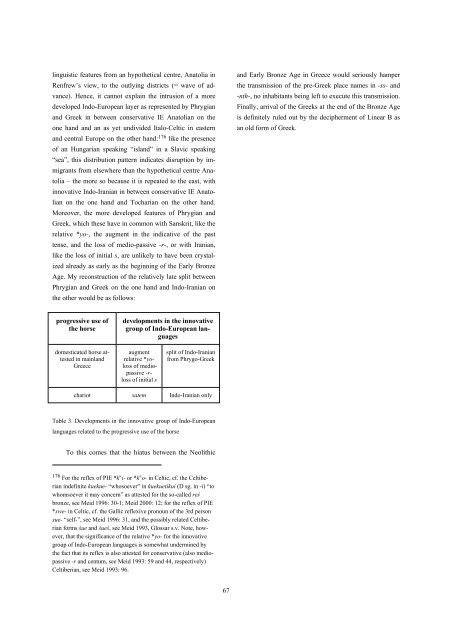The Ethnicity of the Sea Peoples - RePub - Erasmus Universiteit ...
The Ethnicity of the Sea Peoples - RePub - Erasmus Universiteit ...
The Ethnicity of the Sea Peoples - RePub - Erasmus Universiteit ...
You also want an ePaper? Increase the reach of your titles
YUMPU automatically turns print PDFs into web optimized ePapers that Google loves.
linguistic features from an hypo<strong>the</strong>tical centre, Anatolia in<br />
Renfrew’s view, to <strong>the</strong> outlying districts (= wave <strong>of</strong> advance).<br />
Hence, it cannot explain <strong>the</strong> intrusion <strong>of</strong> a more<br />
developed Indo-European layer as represented by Phrygian<br />
and Greek in between conservative IE Anatolian on <strong>the</strong><br />
one hand and an as yet undivided Italo-Celtic in eastern<br />
and central Europe on <strong>the</strong> o<strong>the</strong>r hand: 176 like <strong>the</strong> presence<br />
<strong>of</strong> an Hungarian speaking “island” in a Slavic speaking<br />
“sea”, this distribution pattern indicates disruption by immigrants<br />
from elsewhere than <strong>the</strong> hypo<strong>the</strong>tical centre Anatolia<br />
– <strong>the</strong> more so because it is repeated to <strong>the</strong> east, with<br />
innovative Indo-Iranian in between conservative IE Anatolian<br />
on <strong>the</strong> one hand and Tocharian on <strong>the</strong> o<strong>the</strong>r hand.<br />
Moreover, <strong>the</strong> more developed features <strong>of</strong> Phrygian and<br />
Greek, which <strong>the</strong>se have in common with Sanskrit, like <strong>the</strong><br />
relative *yo-, <strong>the</strong> augment in <strong>the</strong> indicative <strong>of</strong> <strong>the</strong> past<br />
tense, and <strong>the</strong> loss <strong>of</strong> medio-passive -r-, or with Iranian,<br />
like <strong>the</strong> loss <strong>of</strong> initial s, are unlikely to have been crystalized<br />
already as early as <strong>the</strong> beginning <strong>of</strong> <strong>the</strong> Early Bronze<br />
Age. My reconstruction <strong>of</strong> <strong>the</strong> relatively late split between<br />
Phrygian and Greek on <strong>the</strong> one hand and Indo-Iranian on<br />
<strong>the</strong> o<strong>the</strong>r would be as follows:<br />
progressive use <strong>of</strong><br />
<strong>the</strong> horse<br />
domesticated horse attested<br />
in mainland<br />
Greece<br />
developments in <strong>the</strong> innovative<br />
group <strong>of</strong> Indo-European languages<br />
augment<br />
relative *yoloss<br />
<strong>of</strong> medio-<br />
passive -rloss<br />
<strong>of</strong> initial s<br />
split <strong>of</strong> Indo-Iranian<br />
from Phrygo-Greek<br />
chariot satem Indo-Iranian only<br />
Table 3. Developments in <strong>the</strong> innovative group <strong>of</strong> Indo-European<br />
languages related to <strong>the</strong> progressive use <strong>of</strong> <strong>the</strong> horse<br />
To this comes that <strong>the</strong> hiatus between <strong>the</strong> Neolithic<br />
176 For <strong>the</strong> reflex <strong>of</strong> PIE *k w i- or *k w o- in Celtic, cf. <strong>the</strong> Celtiberian<br />
indefinite kuekue- “whosoever” in kuekuetikui (D sg. in -i) “to<br />
whomsoever it may concern” as attested for <strong>the</strong> so-called re<br />
bronze, see Meid 1996: 30-1; Meid 2000: 12; for <strong>the</strong> reflex <strong>of</strong> PIE<br />
*swe- in Celtic, cf. <strong>the</strong> Gallic reflexive pronoun <strong>of</strong> <strong>the</strong> 3rd person<br />
sue- “self-”, see Meid 1996: 31, and <strong>the</strong> possibly related Celtiberian<br />
forms ue and ue, see Meid 1993, Glossar s.v. Note, however,<br />
that <strong>the</strong> significance <strong>of</strong> <strong>the</strong> relative *yo- for <strong>the</strong> innovative<br />
group <strong>of</strong> Indo-European languages is somewhat undermined by<br />
<strong>the</strong> fact that its reflex is also attested for conservative (also mediopassive<br />
-r and centum, see Meid 1993: 59 and 44, respectively)<br />
Celtiberian, see Meid 1993: 96.<br />
67<br />
and Early Bronze Age in Greece would seriously hamper<br />
<strong>the</strong> transmission <strong>of</strong> <strong>the</strong> pre-Greek place names in -ss- and<br />
-nth-, no inhabitants being left to execute this transmission.<br />
Finally, arrival <strong>of</strong> <strong>the</strong> Greeks at <strong>the</strong> end <strong>of</strong> <strong>the</strong> Bronze Age<br />
is definitely ruled out by <strong>the</strong> decipherment <strong>of</strong> Linear B as<br />
an old form <strong>of</strong> Greek.

















